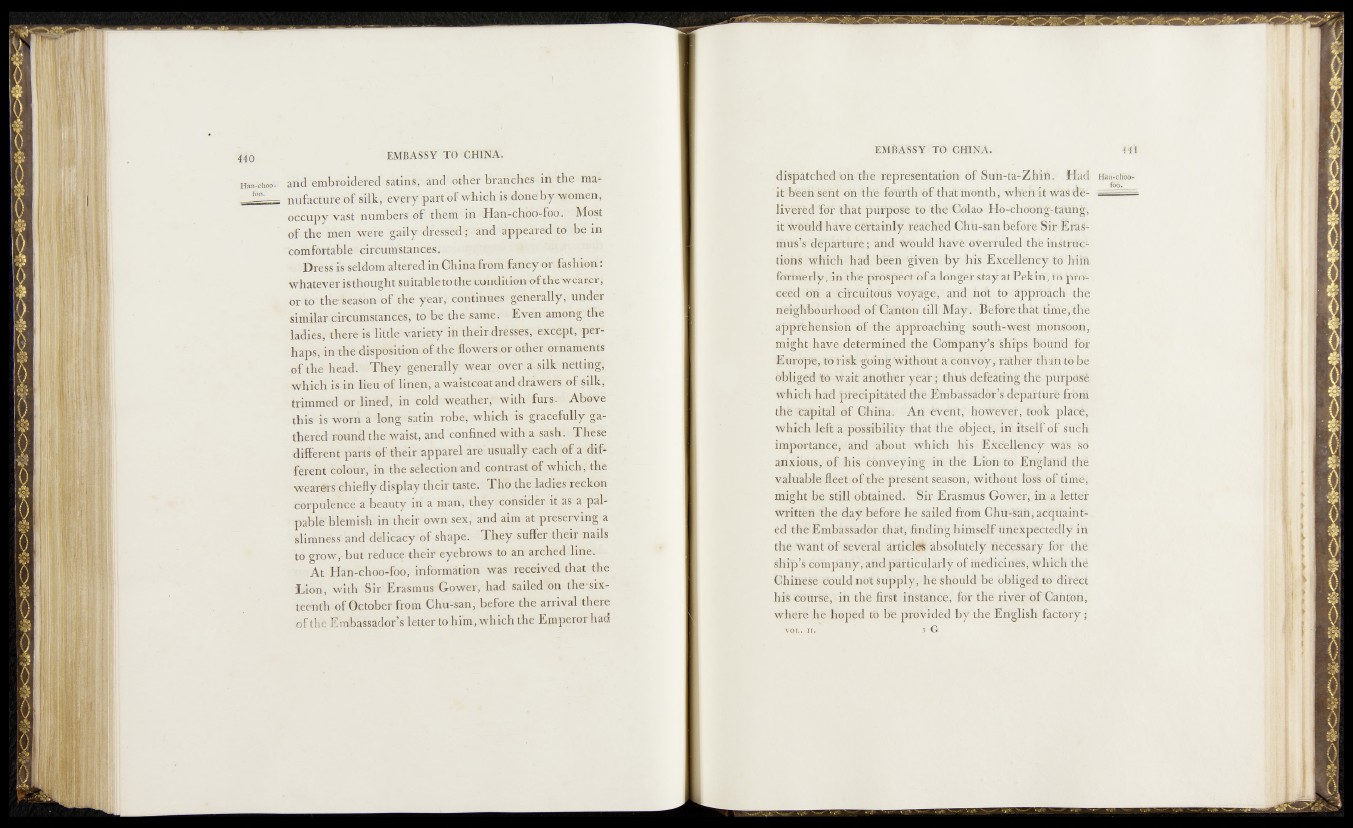
I aiad^mbr&iiiefedisatingpand otheF branches dn the ma-
= isdoii&by.w>i®aiii
occupy vast numbersfof them in Han-cho'O-foo. "Most
of the men were igaily dressediptond appeared to be in
comfortable 'mrcuxbkanees:* ' <
* Dress is seldom altered iii Chinarfrem fanfeywcfashiorr:
whateveristhought suitable to the condition of the wearer;
| onto thek&sbmbf the fear, continues generally, under
{similar circumstances; to b e the same:-' ■ Even-among’the
ladies, there is litdevari^yfetheirdidss^v'excopt.perhaps,
H&ti-ehdo-
t . fo'&l’- |
in the disposition of th'g/fl'GWers^or ether ornaments
of the head. They generally w e a ^ 3Ven^S;ilt>n'ettirt^
which is in liefoof linen, a waistcoat and draWeis.of silk,
trimmed orilined, in cold weather^with-fuiss-r Above
this is w drna long 'satin robe, which i s ^ c e ju l ly p *
thered round thefraist, and confined with a sash. These
different parts ^of their apparel are usually each of a> dtff-
f e e h t i i l ’dur, in the selection and.contrasiof which; the
yeatfirs,Chiefly display itttefr taste. Tho thedadfeSfeeckan
corpulence a beauty ih a m^,'theyrdonsiaer it as: a^al-
* pablbhlemish in their own sex,' and aim at^rescwfeg a
Slimness: and delicacy of shape. They suffer th-eii&nails
to grow,-but reduce their eyebrows to an arched line. *
At Han-choo^fob, information was received that the
Jjion, with Sir Erasmus ’Gowery had1 sailedftm thersix-
teenth :of ©ctober from Chu-san, before the arrival there
o f the Embassador- S litter to him , which the Ejpaperot had
dfepMChed toil the rfeprfesetitatitoft 6f Suft-ta-Zhih. Had
ifM b h ^M dnilpffonrth of thA-ihonth, whfelilt was de-
liWeflEfed for ffiatpufpblfe tto ’the Gblao Ho-clMfrfg- taring,
it 'WbMd h a ^ hR ta in ly rMchtod’ Chii-&an. befdrte Sir Eras-
mu's's departure; and Wbul’d havetoWerriiled thfe instructions
which had beteh 'gi^fe’n by his^ExcMleney Id Mift
foiffoetfiyi-ilh the ptolspetftp’f l lbnf^ef Stflf at jPekih [ fo p ¥ # .
<fedd oil a toii-etiitduS 'Vcty^e',^and hdt to^appito^eh th&
neighbourhood d^OSfltdn till May. lyefi&tothat tirh'ej|ih%
appffehfehSibh of ’the'dp'prba'chihg Sdutli-WeM ®bns^>bii,
might have determined the GotSpatl^ "Ships btoUnd' for
Europe, foti^k'gfli^hg^ithbtot a corivby,’father tfthitobe
obliged fo Wait aftothfer ye'if'; thtofc deffeMWg thfe pbrpd§&
Whifeh had ptfecipititfed thfe Embassadorsdfepaf forhfrbhi
Ai An 'evdfft-, hbW&frfer, took platto^
whibhdfeft a possibility that fhfe bbjetfe*4ri' Isfelhoft focii
importance,- and abbht Whifeli his Ekcfellfe¥fcy WAS: W
arixibus-, of his boriCfefing:dto. thfe Libri tb Entghifld thfe
valuable llfefet: of thfe pfesSlit ^feasOrl, Witfiflut fogs bf'tiUiej
might ;b# still obtained. Sir Era^icthl ©^werrSh a lettef
written the d a f before he sailed frorfi ChU-featlj actplamti,
I f thfe EmbaSfeador that, folding hiMsfelf flftekpgctecHy ih
the want bf several article absblhtely;fflefee§^ary for- th'e
shipyebmpatiy ,;ahd particdiarlfbfffledicliifeis,'Whifehthe
Ghifiesfe Could not supply, he Should blhbliged tbJdirect
where he hoped tb life provided b y 'th e !Eii|rlMl fafcibiy 1
H^h-cK6d- fS6;
ypL. ii.